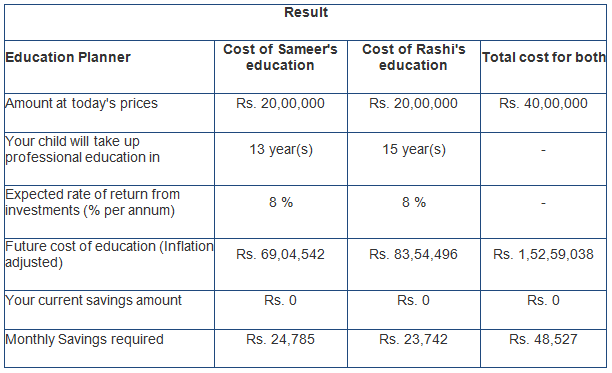Planning your child’s future: Part 1

Like many parents back in the 80s, my parents also wanted me to become either an engineer or a doctor. Not that the prospect of becoming an engineer excited me a lot, but as an obedient son, I studied hard and got admitted into one of the most well known engineering institutes in the country. Can you guess how much my parents had to pay for my engineering college tuition fees? Less than र 400 a year and this was about 25 years back. Today college tuition fees in good private engineering colleges can run into few lakhs per annum. Of course, I studied in a Government engineering institute, where education was heavily subsidized and it still continues to be, but we should remember that competition for seats in good colleges is now, far more intense than ever before. Therefore, it is always prudent not to take a chance and budget wisely for your children’s higher education.
Aspirations have also changed. My parents were perfectly happy with me going a good Government university. Fast forward to today and many of my friends want their children to go to the United States for their undergraduate studies. Average undergraduate college tuition fees in the US can cost parents $10,000 to $30,000 a year; it is usually on the higher side for foreign students. Add to that, living expenses, accommodation, travel etc and your yearly expenses for your child’s US education can be a vast chunk of what you earn or even more. The huge cost, relative to their financial situation, however, does not stop people from aspiring and it should not. After all, we want nothing but the very best for our children.
When we talk about aspirations and lifestyle, look at weddings now and compare them with, what they were 20 years back. Weddings are much more lavish affairs now and parents are splurging on their children’s weddings. But obviously, it costs a lot of money. It is not just the wedding day expenses that I am talking about. Based on the marriages that I have attended in the last few years, I have observed that, even some of the pre-wedding ceremonies like engagement, Mehendi, Sangeet, Tilak, etc are almost, as grand as some of the actual wedding ceremonies were 20 or 25 years back. Gifts from the parents to the bride or bridegroom are also much more expensive than they were ever before. A child’s wedding is one of the most joyous occasions in the lives of the parents and it is perfectly understandable that parents to make it as special as possible, but many a times it is seen that, parents spend way beyond their means in their children’s weddings. This has financial consequences which parents have to suffer later.
All parents have high aspirations for their children. But if they do not plan properly, then parents may have compromise on other important financial objectives to meet those aspirations. But what is even more painful to parents is, when they are not able to fulfil their aspirations due to paucity of funds. Both the situations are not good for parents and therefore, we believe that financial planning, from an early stage, is critically important in meeting the aspirations you have for your child. In this post, we will discuss how financial planning can help you meet your children’s goals.
What is Financial Planning?
Life, for most of us, is not just about having one goal. We have multiple goals and at different stages of life, different goals seem relatively more important to us. For example, if you are in your early thirties and do not own a house, buying a house may seem to be a very important goal. Retirement, which is twenty five or thirty years away may not seem to be a very important goal. On the other hand, if you are in your twenties and recently married without children, children’s college education is so far away, that you may not really be concerned about it. However, over your entire saving and investing lifecycle, are any of these goals less important? No, all the goals are very important. Financial planning, in very simple terms, is defining your different life goals in financial terms, and making a plan to meet all the goals. If you read our post, How will personal Financial Planning help you, you will realize that, financial planning can help you meet your short term, medium term and long term financial objectives, without compromising on any of those objectives.
Why is financial planning important for your children’s future?
Let us assume that, your annual income is र 20 lakhs and you save 20% of your income. 20% savings rate is, by the way, quite a lot, especially once you factor in home loan EMIs. Suppose you want your child to get into an engineering degree. Cost of engineering education in private colleges can easily be र 20 – 25 lakhs in today’s costs. That means 5 years of your savings will go simply towards your child’s college education. If you want your child to go for an MBA degree after his or her graduation, a few more years of savings will go towards funding just that. If you are aspiring for a foreign degree for your child, you will need to spend many more years of your savings.
Your child’s higher education and wedding expenses can easily add up to be 10 years of your savings. In our post, Retirement planning: Why should you get serious about it now, we discussed how challenging it is to build an adequate retirement nest egg, even if we save at a moderate rate throughout our working lives. We have multiple financial goals in our lives and if we do not start planning from an early stage of our careers, chances are that, we will fall short of meeting one or more goals.
Goal Setting is important in Financial Planning
The first step of financial planning is clearly defining your goals in quantifiable terms. Akash and Seema want their children, Sameer (aged 5) and Rashi (aged 3) to get engineering degrees. You can see that, their goals are very clear. Next step will be to forecast how much it will cost them, when Sameer and Rashi go to college. Let us assume cost of engineering educations at today’s prices is र 20 lakhs. Akash and Seema will then have to factor in inflation. They should not use the CPI rates, because different goods and services in our consumption basket have different inflation rates. Inflation rates are highest in the education and healthcare sectors. Within the education sector, cost inflation of engineering and MBA courses are the highest, growing at double digit rates. Akash and Seema factor in a 10% inflation rate. Now they can calculate the future cost of their children’s education. The next step will be to calculate, how much they need to save based on the expected return on investment. Akash and Seema plan to save from their salary accounts and invest in recurring deposits for their children. Long term historical interest rate has been around 8%. Akash and Seema can then calculate, how much savings will be required, to meet their kid’s education. Does this sound complicated? You can simply use our Education Planner and our tool will do all the calculations for you. The table below shows the result of our Education Planner, once I enter the details for Akash and Seema in the calculator.

Source: Advisorkhoj Education Planner
You can see that, Akash and Seema have to save close to र 50,000 a month for their children’s education. Considering that, they may have other investments like home loan EMIs, car loan EMIs, retirement planning, the amount they have to set aside for their children is quite substantial. Remember, Akash and Seema have to save this amount, simply for Sameer and Rashi’s graduate education. If they want their children to pursue Masters Degrees, they have to save even more. The amount which Akash and Seema have to save every month may have surprised many of our readers; but it is the reality. If Akash and Seema did not do this goal planning exercise, they would not have any idea how much they would have to save and would have become victims of complacency like many of us. Goal planning is therefore a very important exercise in planning your children’s futures.
Financial challenge for parents is daunting but.......
Akash and Seema’s examples may have impressed upon you the challenge of saving for your children’s higher education. If you are not able to save a sufficient amount for your child, you may have to scale back on your ambition, you may have to take an expensive loan or as many parents do, compromise on your own financial future, like using the money saved for retirement to fund your children’s education and marriage. The objective of this article is not to scare parents, but to simply make them aware of the challenge. With careful financial planning, it is possible to meet the aspirations you have for your children and also meet all your other financial goals. You simply have to remember 4 important mantras of personal financial success.
- Early start to leverage the power of compounding
- The importance of fiscal discipline
- Understanding the difference between saving and investing
- The importance of risk management
If you imbibe and religiously practise these 4 mantras in your financial life, you will be able to meet all your financial aspirations without difficulty. In the next part of this post, we will discuss how you can use these 4 mantras to secure your child’s future.
Mutual Fund Investments are subject to market risk, read all scheme related documents carefully.
RECOMMENDED READS
Sundaram Asset Management Company is the investment manager to Sundaram Mutual Fund. Founded 1996, Sundaram Mutual is a fully owned subsidiary of one of India's oldest NBFCs - Sundaram Finance Limited.
Quick Links
- Interview - Mr. Dwijendra Srivastava - CIO - Fixed Income
- Interview - Mr. Sunil Subramaniam - CEO
- Sundaram Select Midcap Fund: Consistent outperformance makes it a big wealth creator
- Interview - Mr. Sunil Subramaniam - CEO
- Fund Manager Interview - Mr. Krishna Kumar - CIO - Equities
- Sundaram Rural India Fund: This thematic Mutual Fund aiming good long term returns
- Sundaram Equity Multiplier: Long term wealth creation potential
- Our Articles
- Our Website
- SIP one sheeter-Investor Education initiative
- Sundaram Asset Management Singapore
- Returns Calculator
- SEBI Investor Awareness Initiative
- Check your KYC Status
- KYC Forms & FAQs
- Recieve your PIN
- A note on NIGO
- FAQs on RGESS
- FAQs on Direct Plan
- Receive Updates
- Share your views
- Transmission Checklist
- Equity Application Form
- Fixed Income Application Form
- Transaction Slip
- Factsheet May - 2016
- MF Tax Reckoner 2015
Follow Sundaram MF
More About Sundaram MF
POST A QUERY



